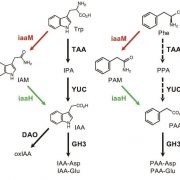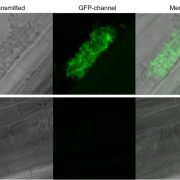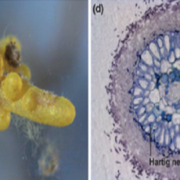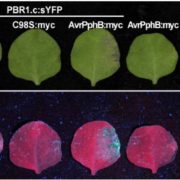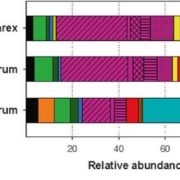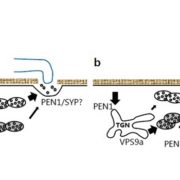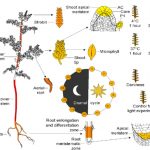Insect herbivory antagonizes leaf cooling responses to elevated temperature in tomato (PNAS)
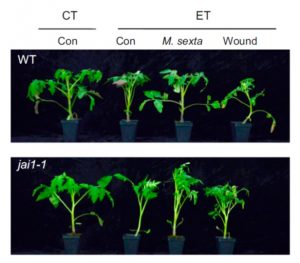 Plants have strategies to cool themselves when the temperature is hot. These include increasing their rate of transpirational cooling through stomatal opening and raising their leaves, which can enhance air flow. Previous studies have shown a role for the heat shock proteins (HSPs) and their cochaperone SGT1 in mediating this response, in part through stabilizing the auxin receptor TIR1, and also implicated this protein complex in the regulation of jasmonate signaling. Here, Havko et al. show that mild temperature stress enhances jasmonate responses to wounding through stabilizing the COI1 receptor, and effectively blocks the thermomorphogenic responses, which can cause plants to overheat. Furthermore, as insects are poikilotherms, their activity level can be positively affected by mild temperature increases, as found here by the authors. The authors conclude, “Our findings suggest that the combined effects of insect herbivory and rising ambient temperatures will cause greater crop losses than either stress alone,” and call for greater research into the mitigation of co-occurring stresses. (Summary by Mary Williams) Proc. Natl. Acad. Sci. USA 10.1073/pnas.1913885117
Plants have strategies to cool themselves when the temperature is hot. These include increasing their rate of transpirational cooling through stomatal opening and raising their leaves, which can enhance air flow. Previous studies have shown a role for the heat shock proteins (HSPs) and their cochaperone SGT1 in mediating this response, in part through stabilizing the auxin receptor TIR1, and also implicated this protein complex in the regulation of jasmonate signaling. Here, Havko et al. show that mild temperature stress enhances jasmonate responses to wounding through stabilizing the COI1 receptor, and effectively blocks the thermomorphogenic responses, which can cause plants to overheat. Furthermore, as insects are poikilotherms, their activity level can be positively affected by mild temperature increases, as found here by the authors. The authors conclude, “Our findings suggest that the combined effects of insect herbivory and rising ambient temperatures will cause greater crop losses than either stress alone,” and call for greater research into the mitigation of co-occurring stresses. (Summary by Mary Williams) Proc. Natl. Acad. Sci. USA 10.1073/pnas.1913885117


